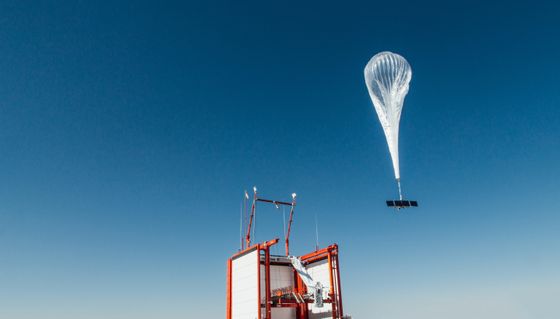Backwind on Google's 'Project Loon' to provide Internet in a balloon

Google's internet balloons face doubts from potential customers | VentureBeat
https://venturebeat.com/2019/07/01/loon-google-internet-face-doubts-from-potential-customers/
'Project Loon' is a project that provides Internet communication networks to areas where the Internet has not been maintained by communicating multiple balloons installed at high altitudes with each other. You can see the whole of Project Loon and the appearance of the balloon actually used by reading the following article.
Apparently, Google will become a carrier within a few months, with a balloon and a drone that is an astonishing future of net ok anytime, anywhere? -GIGAZINE

Project Loon, which has been modified and tested since 2013 in New Zealand in 2013, started its first trial commercial operation in Kenya in 2019. Kenyan aviation authorities say they plan to sign a final approval by July 2019, and within the next few weeks 4G news from a tie-up with Kenya's third telecom carrier Telkom Kenya will bring Kenya's It is expected to be provided to mountainous areas.
Project Loon has long been drawing attention as an attempt to disseminate the Internet to areas where communication networks have not been established, and in April 2019, Softbank made $ 125 million (approximately ¥ 13.5 billion Was announced to invest ).
At the statement, Loast's CEO Alastair Westgards said, “We have been building on our many years of technology development, more than 35 million kilometers of flight, and our track record of hundreds of thousands of people on the web. I have a chance to connect with many people. '
◆ Technical issues
While Loon's CEO shows confidence, many operators, such as Telkom Indonesia in Indonesia, Vodafone New Zealand in New Zealand, and Orange, a major telecommunications carrier in France, have a slightly different attitude. 'Our business in Kenya will be a test stone for Loon to prove its capabilities,' said Hervé Suquet, Chief Technology Innovation Officer at Orange Middle-East & Africa, a branch of Orange.

After all, Loon's balloons have some difficult challenges. First of all, it is pointed out that one balloon costs several tens of thousands of dollars (about several million yen) as a problem in terms of cost, and the plastic outer shell is further deteriorated by sunlight etc. , Should be replaced every 5 months.
There are also some restrictions on where you can install it. Since Loon balloons are powered by photovoltaic systems, their operation is based on the ability to receive abundant sunlight throughout the year. In addition, it has been pointed out that installing in a location close to an urban area may damage existing communications. Although there is a system that observes a stable air flow and keeps the balloon in a certain area, once the balloon is moved by the wind and moved, users on the ground can not communicate.
◆ Issues by region
Loon also faces political issues. Loon

However, Loon, who actually started the project in Indonesia, will face difficulties such as a conspiracy theory that there is a surveillance camera on the balloon, and Indonesia's authorities have suspected Google's tax evasion. According to sources familiar with Loon's work in Indonesia, these difficulties have been the provision of pork sandwiches to Muslim officials when they were invited to Google headquarters in Indonesia There is also a view that it is starting to
Loon has obtained preliminary permission from the government only in June 2019, but the Indonesian Department of Defense has informed the media that 'security inspection including camera inspection has not been completed yet', Loon It is clear that there are still legal issues that need to be cleared to put operations in Indonesia on track.
In addition, Spanish telecommunications carrier Telefonica, who has been in discussions with Loon for many years, has recently been introducing solar power generation to existing telecommunications facilities, and is showing a movement to seek options other than Loon You Similarly, in Latin American countries where Project Loon was expected to be introduced, concerns about the nature of balloons that are susceptible to hurricanes have increased the tendency to look for alternative means such as disaster resistant cell towers.
Related Posts:
in Hardware, Posted by log1l_ks







